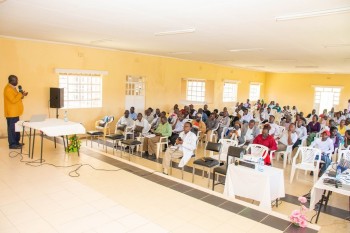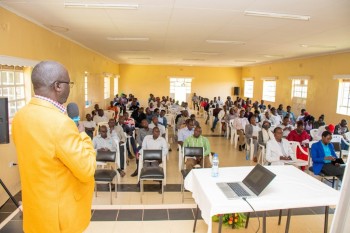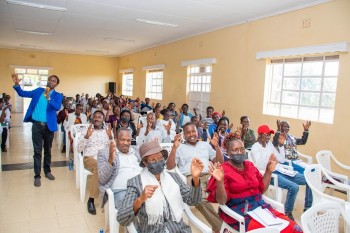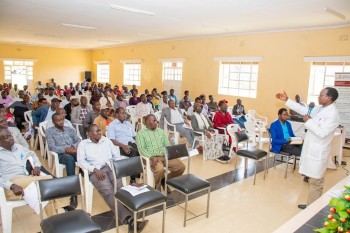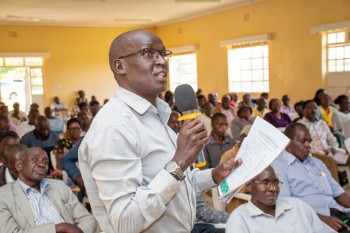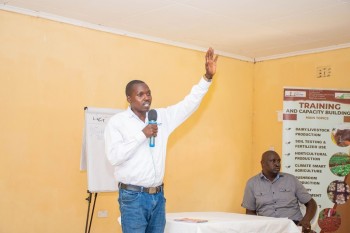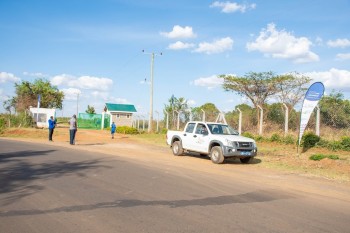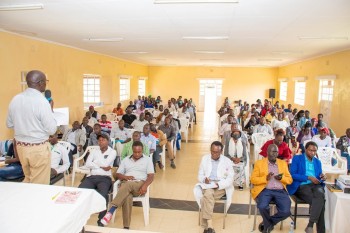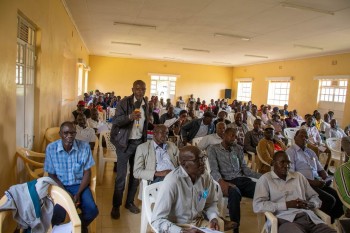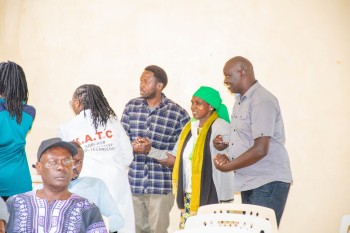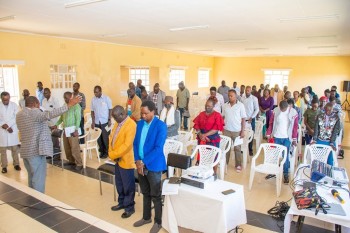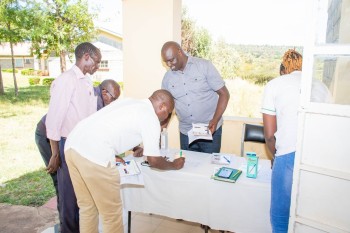The University of Eldoret, Outreach and International Students’ Centre (OISC) in collaboration with the Koibatek Farmers Training College (KFTC) and the Department of Agriculture, Baringo County organized for a one-day farmers’ training on Climate Smart Agriculture on Friday, 15th March 2024. The training was organized following a request from the KFTC through the Department of Agriculture, Baringo County. One hundred and eighteen (118) participants attended the training. This included the Principal KFTC, who was the host, four (4) UOE staff members and one hundred and thirteen (113) farmers. Dr. Daniel Chebet, Head of Seed, Crop and Horticultural Sciences facilitated the training. The hosting Principal introduced the farmers’ and the Coordinator OISC introduced the UOE team and gave a brief on the University and the Outreach Centre.
The training started at 11.00 am and ended at 2.45pm. The farmers were introduced to what Climate Smart Agriculture is, and examples provided. The reality of climate change was laid bare to the farmers, reminders being given that the Kenyan climate has changed so much such that in highland areas, farmers now harvest less than 15 bags of maize/acre from a high of 40-45 bags 30 years ago. The foundations of Climate Smart Agriculture were then laid down to the farmers, and divided into 4 parts.
The first foundation was laid out to be Smart Water Management. The farmers were informed that water conservation begins as soon as the rain falls on the farmers’ field. This based on the concept that all the rainwater that falls on the farmers’ fields are for their use, and all effort must be put to harness, conserve and defend that water from being lost or wasted. They were informed that water conservation goes beyond putting up water conservation structures like dams and water pans. The best water conservation structure was brought out to be underground water storage. They were informed on the impediments to water infiltration, chief of which is formation of hard pans about 45-60 cm beneath the soil.
The farmers were cautioned on the common practice of allowing cows to enter and feed on maize stovers after harvest. They were made aware that this is damaging to the soil and they should refrain from it. Farmers were also advised against removing the stovers from the land and burning of the crop residues before ploughing the land. Instead, they were advised to leave the crop residues in the soil to act as a mulch and also to enrich the soil. Farmers were also advised not to plough the land by using disc and mouldboards and then harrow, but instead to use tillers and chisel ploughs so they can break the hardpan. Once they do this, the land will be able to infiltrate more water and the crops can withstand the reduced rainfall.
The second foundation as far was water conservation is concerned is putting up of terraces. The farmers were trained on the importance of terraces, and a link between reduced yields, soil erosion and flooding of downstream areas was emphasized. The case examples of good terrace making was provided from Machakos County. The farmers were also taught about the concept of recharge wells, which entails deliberate transfer of rainwater into the soil via wells. This strategy would enable the farmers to have water available for irrigation. A recharge well was suggested for every one acre of land. Farmers were also told about the concept of fog harvesting.
The second foundation that the farmers were trained on is on Smart Land and Crop Management strategies. They were trained on green manure crops and having vegetative mulch cover on the soil surface at all times. Crop rotation was also emphasized, and planting of crops that sterilize the soils by releasing glucosinolates. Such crops include those in the cabbage family such as canola. Training was further done on set up of vertical gardens and dryland/dry season planting techniques such as zai pits and fertility drenches, both for subsistence and commercial vegetable crops.
Overall, the experience of participating in this programme was very good. It was a good opportunity to market the University and its programmes. The allocated time was very well spent.


